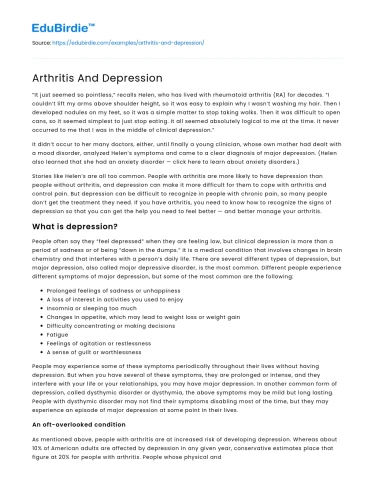“It just seemed so pointless,” recalls Helen, who has lived with rheumatoid arthritis (RA) for decades. “I couldn’t lift my arms above shoulder height, so it was easy to explain why I wasn’t washing my hair. Then I developed nodules on my feet, so it was a simple matter to stop taking walks. Then it was difficult to open cans, so it seemed simplest to just stop eating. It all seemed absolutely logical to me at the time. It never occurred to me that I was in the middle of clinical depression.”
It didn’t occur to her many doctors, either, until finally a young clinician, whose own mother had dealt with a mood disorder, analyzed Helen’s symptoms and came to a clear diagnosis of major depression. (Helen also learned that she had an anxiety disorder — click here to learn about anxiety disorders.)
Save your time!
We can take care of your essay
- Proper editing and formatting
- Free revision, title page, and bibliography
- Flexible prices and money-back guarantee
Stories like Helen’s are all too common. People with arthritis are more likely to have depression than people without arthritis, and depression can make it more difficult for them to cope with arthritis and control pain. But depression can be difficult to recognize in people with chronic pain, so many people don’t get the treatment they need. If you have arthritis, you need to know how to recognize the signs of depression so that you can get the help you need to feel better — and better manage your arthritis.
What is depression?
People often say they “feel depressed” when they are feeling low, but clinical depression is more than a period of sadness or of being “down in the dumps.” It is a medical condition that involves changes in brain chemistry and that interferes with a person‘s daily life. There are several different types of depression, but major depression, also called major depressive disorder, is the most common. Different people experience different symptoms of major depression, but some of the most common are the following:
- Prolonged feelings of sadness or unhappiness
- A loss of interest in activities you used to enjoy
- Insomnia or sleeping too much
- Changes in appetite, which may lead to weight loss or weight gain
- Difficulty concentrating or making decisions
- Fatigue
- Feelings of agitation or restlessness
- A sense of guilt or worthlessness
People may experience some of these symptoms periodically throughout their lives without having depression. But when you have several of these symptoms, they are prolonged or intense, and they interfere with your life or your relationships, you may have major depression. In another common form of depression, called dysthymic disorder or dysthymia, the above symptoms may be mild but long lasting. People with dysthymic disorder may not find their symptoms disabling most of the time, but they may experience an episode of major depression at some point in their lives.
An oft-overlooked condition
As mentioned above, people with arthritis are at increased risk of developing depression. Whereas about 10% of American adults are affected by depression in any given year, conservative estimates place that figure at 20% for people with arthritis. People whose physical and social activities are limited by arthritis are at especially high risk.
Despite how common depression is among people with arthritis, the condition can be easy for doctors to overlook. Along with mood-related symptoms, depression can cause some of the very same physical symptoms that arthritis causes, including joint pain, back pain, muscle aches, fatigue, and sleep disturbances. As a result, doctors all too often miss the signs of depression that might be self-evident in a person who did not have chronic pain. A study published in Arthritis Care & Research in 2008 found that of 200 people with RA who had an appointment with 1 of 8 rheumatologists, only 7 people discussed depression during their appointment. Of the 21 participants who had moderate to severe symptoms of depression, only 4 talked to their rheumatologist about the condition. Each time depression was discussed, it was the patient who brought up the topic, not the doctor.
But it can be difficult to talk about depression, even if you’re aware that you’re experiencing it. Tara, an adolescent with RA, describes her feelings this way: “Everything hurt all the time, and I was embarrassed by my physical condition. I almost didn’t even focus on what hurt, or how, or even why. I was not at all in tune with my mind–body connection.… Depression felt like the straw that would break my back. It was easier to ignore it.”
The symptoms of depression are obviously very daunting, and it can be easy to feel helpless. The good news is that getting help can change your life for the better.






 Stuck on your essay?
Stuck on your essay?

